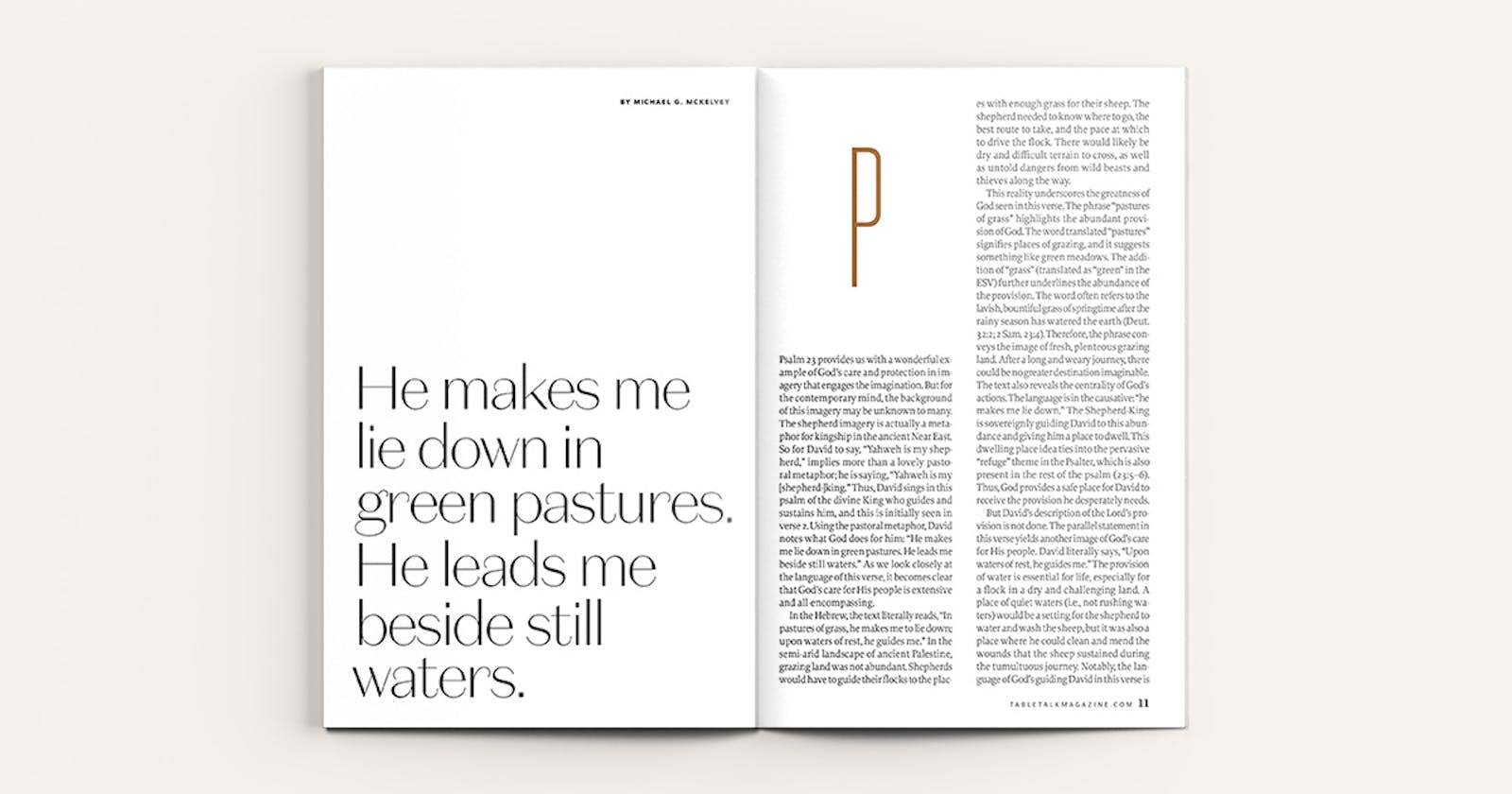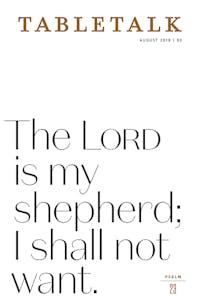
Request your free, three-month trial to Tabletalk magazine. You’ll receive the print issue monthly and gain immediate digital access to decades of archives. This trial is risk-free. No credit card required.
Try Tabletalk NowAlready receive Tabletalk magazine every month?
Verify your email address to gain unlimited access.
Psalm 23 provides us with a wonderful example of God’s care and protection in imagery that engages the imagination. But for the contemporary mind, the background of this imagery may be unknown to many. The shepherd imagery is actually a metaphor for kingship in the ancient Near East. So for David to say, “Yahweh is my shepherd,” implies more than a lovely pastoral metaphor; he is saying, “Yahweh is my [shepherd-]king.” Thus, David sings in this psalm of the divine King who guides and sustains him, and this is initially seen in verse 2. Using the pastoral metaphor, David notes what God does for him: “He makes me lie down in green pastures. He leads me beside still waters.” As we look closely at the language of this verse, it becomes clear that God’s care for His people is extensive and all-encompassing.
In the Hebrew, the text literally reads, “In pastures of grass, he makes me to lie down; upon waters of rest, he guides me.” In the semi-arid landscape of ancient Palestine, grazing land was not abundant. Shepherds would have to guide their flocks to the places with enough grass for their sheep. The shepherd needed to know where to go, the best route to take, and the pace at which to drive the flock. There would likely be dry and difficult terrain to cross, as well as untold dangers from wild beasts and thieves along the way.
This reality underscores the greatness of God seen in this verse. The phrase “pastures of grass” highlights the abundant provision of God. The word translated “pastures” signifies places of grazing, and it suggests something like green meadows. The addition of “grass” (translated as “green” in the ESV) further underlines the abundance of the provision. The word often refers to the lavish, bountiful grass of springtime after the rainy season has watered the earth (Deut. 32:2; 2 Sam. 23:4). Therefore, the phrase conveys the image of fresh, plenteous grazing land. After a long and weary journey, there could be no greater destination imaginable. The text also reveals the centrality of God’s actions. The language is in the causative: “he makes me lie down.” The Shepherd-King is sovereignly guiding David to this abundance and giving him a place to dwell. This dwelling place idea ties into the pervasive “refuge” theme in the Psalter, which is also present in the rest of the psalm (23:5–6). Thus, God provides a safe place for David to receive the provision he desperately needs.

But David’s description of the Lord’s provision is not done. The parallel statement in this verse yields another image of God’s care for His people. David literally says, “Upon waters of rest, he guides me.” The provision of water is essential for life, especially for a flock in a dry and challenging land. A place of quiet waters (i.e., not rushing waters) would be a setting for the shepherd to water and wash the sheep, but it was also a place where he could clean and mend the wounds that the sheep sustained during the tumultuous journey. Notably, the language of God’s guiding David in this verse is found elsewhere in the Old Testament (Ex. 15:13; Ps. 1:3; Isa. 40:11; 49:10), and in this verse it underscores the Lord’s protective escorting of His servant to “waters of rest.” This phrase is often translated as “still” or “quiet” waters, highlighting the calmness of the waters. While this is a perfectly fine way to interpret this verse, it is important to note that the word translated “rest” is actually a noun in Hebrew and is the last word in the phrase “waters of rest.” This implies that “rest” is actually the setting for the waters and the place in which they are found. In the Old Testament, this word for “rest” often refers to Canaan as a place of rest for Israel (Deut. 12:9; 1 Kings 8:56; Isa. 11:10) and to God’s dwelling place (Pss. 95:11; 132:8, 14; Isa. 66:1). This suggests that Yahweh Himself is the place of “rest” in view of Psalm 23:2, and the end of the psalm (v. 6) corroborates this idea. So, the ultimate place of rest for God’s people is God Himself.
This verse in Psalm 23 presents God’s people with the wonder of abundant provision (both materially and spiritually) that we have in His Son, the Good Shepherd. When we pray, “Give us this day our daily bread” (Matt. 6:11), it is grounded in the reality that Jesus, our sovereign King, guides us through this life, providing us with everything we need for each day and for eternal life itself. Everything we have needed up to the present moment has come from His hand (vv. 31–34), and He will continue to provide for us until the day comes when He brings us into the eternal provision of His rest. Christ as the Good Shepherd cares for us along the way, sustaining us each step, in each season. And when we “pass through the waters” of death, Christ will be with us (Isa. 43:2), and He will guide us into the abundant pastures, into “Immanuel’s Land.”
